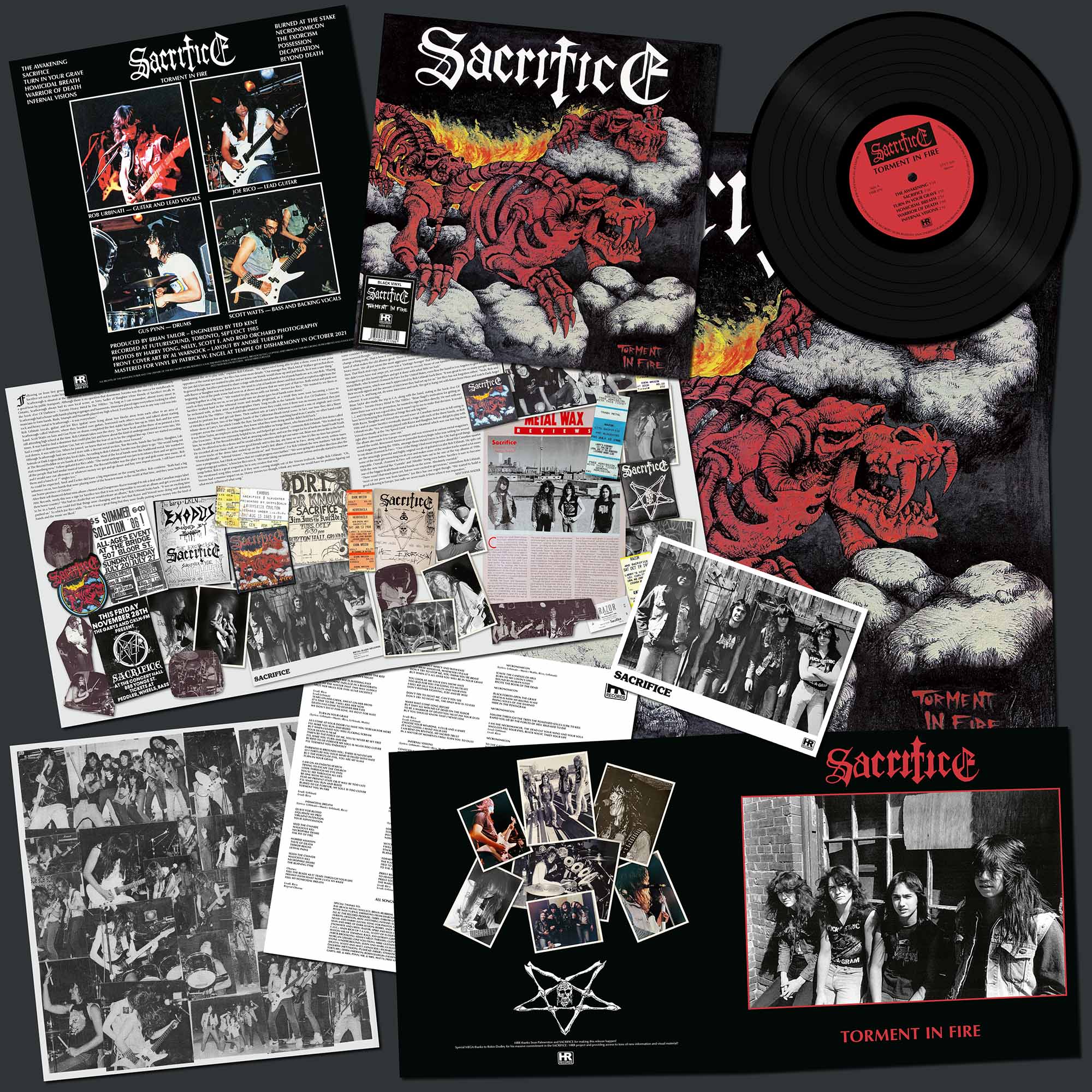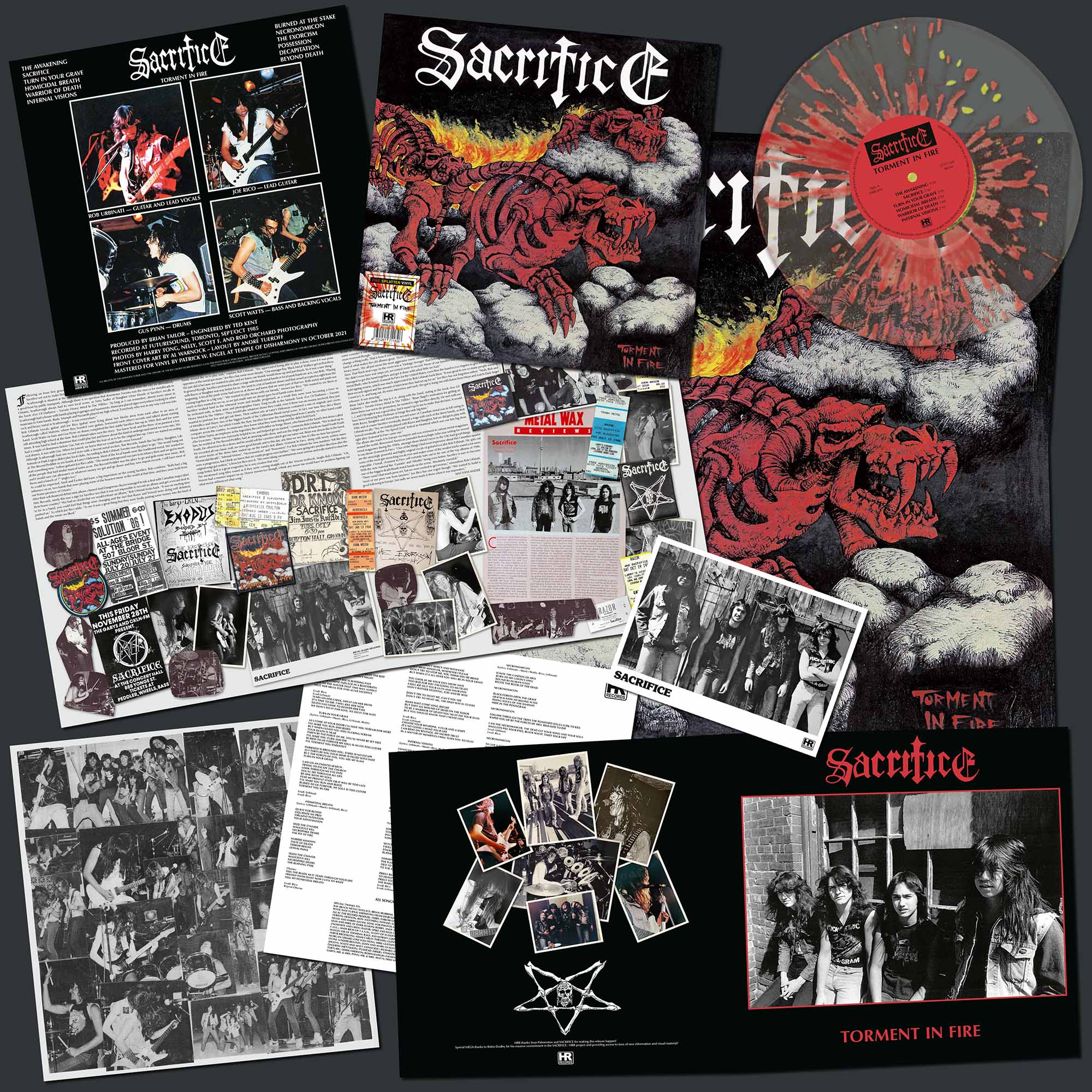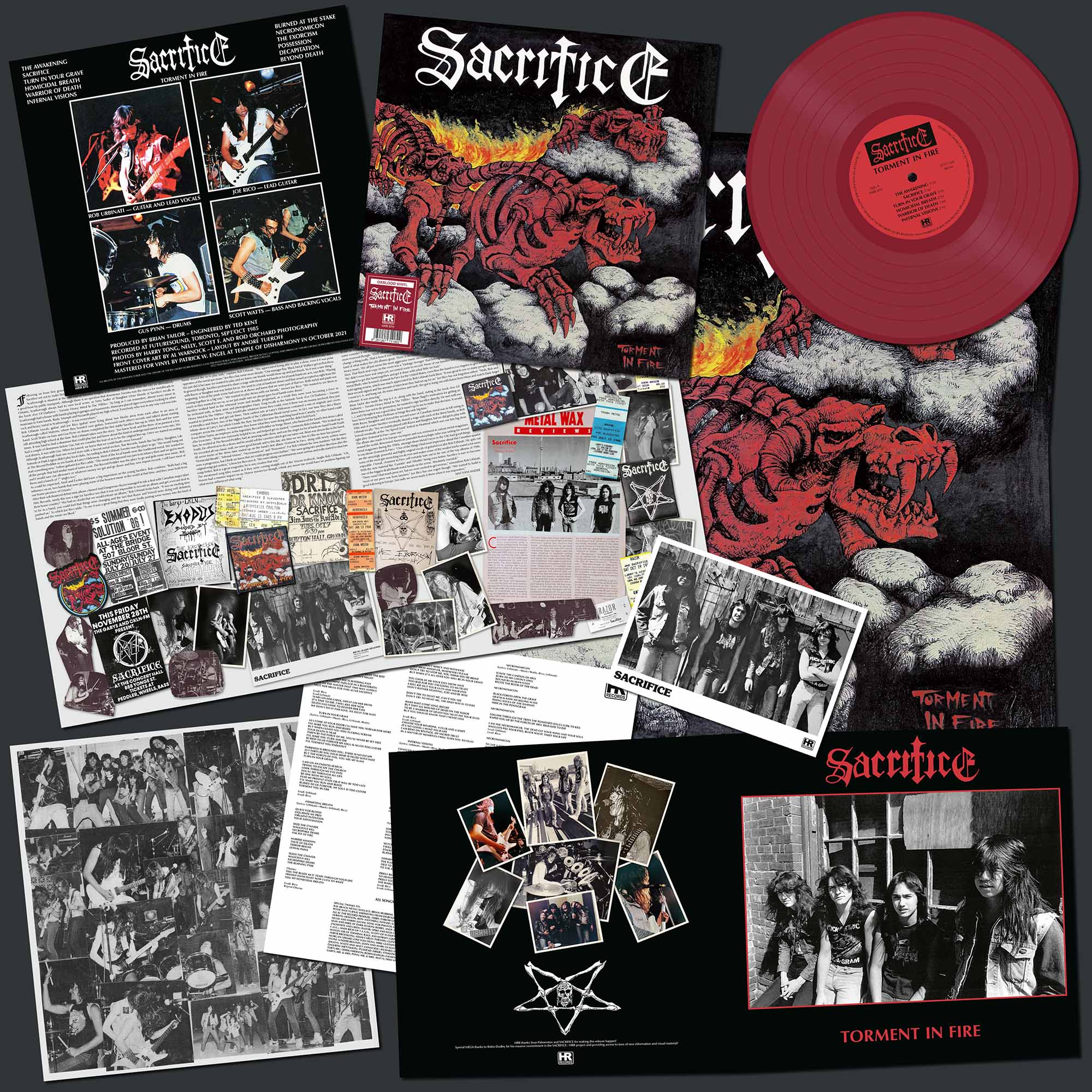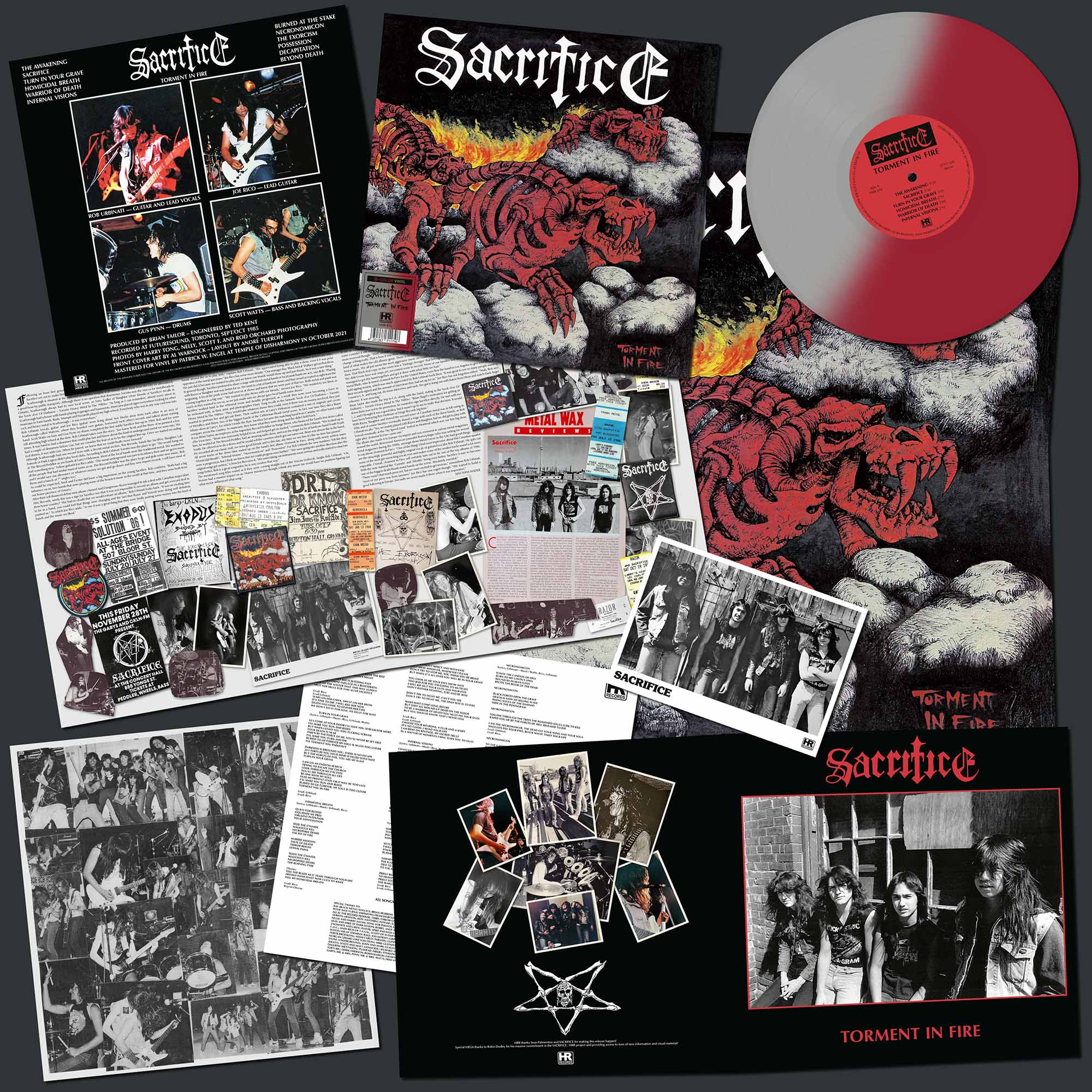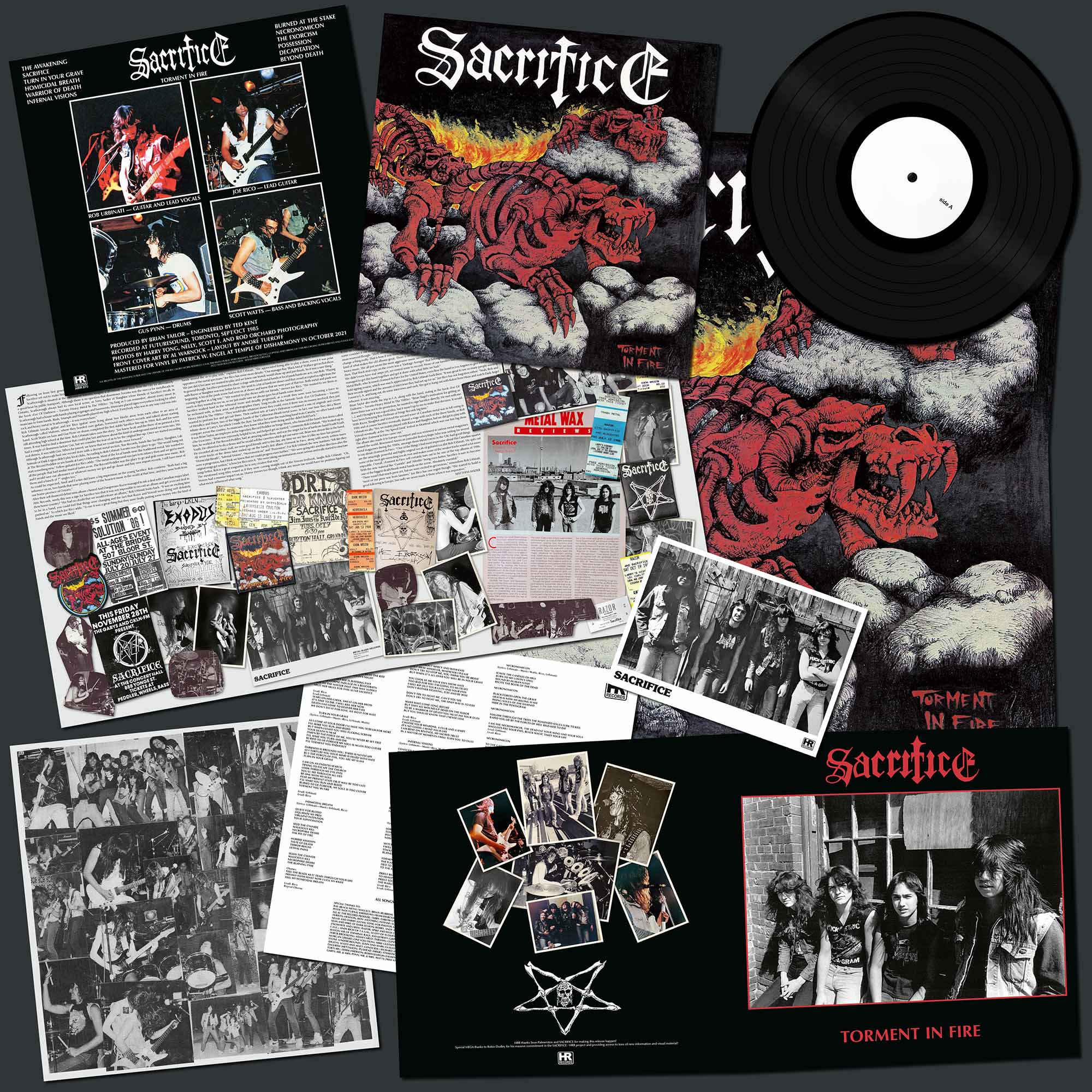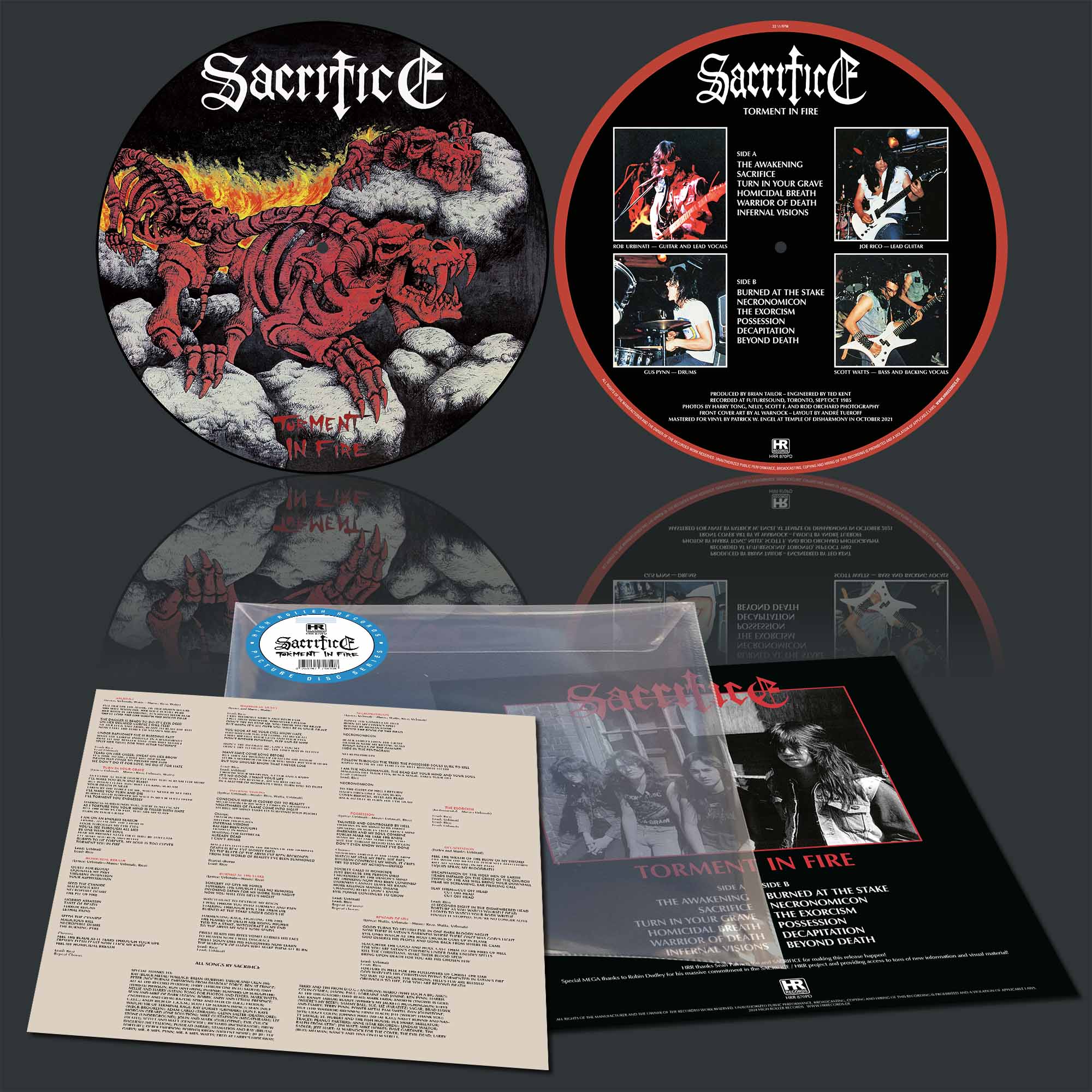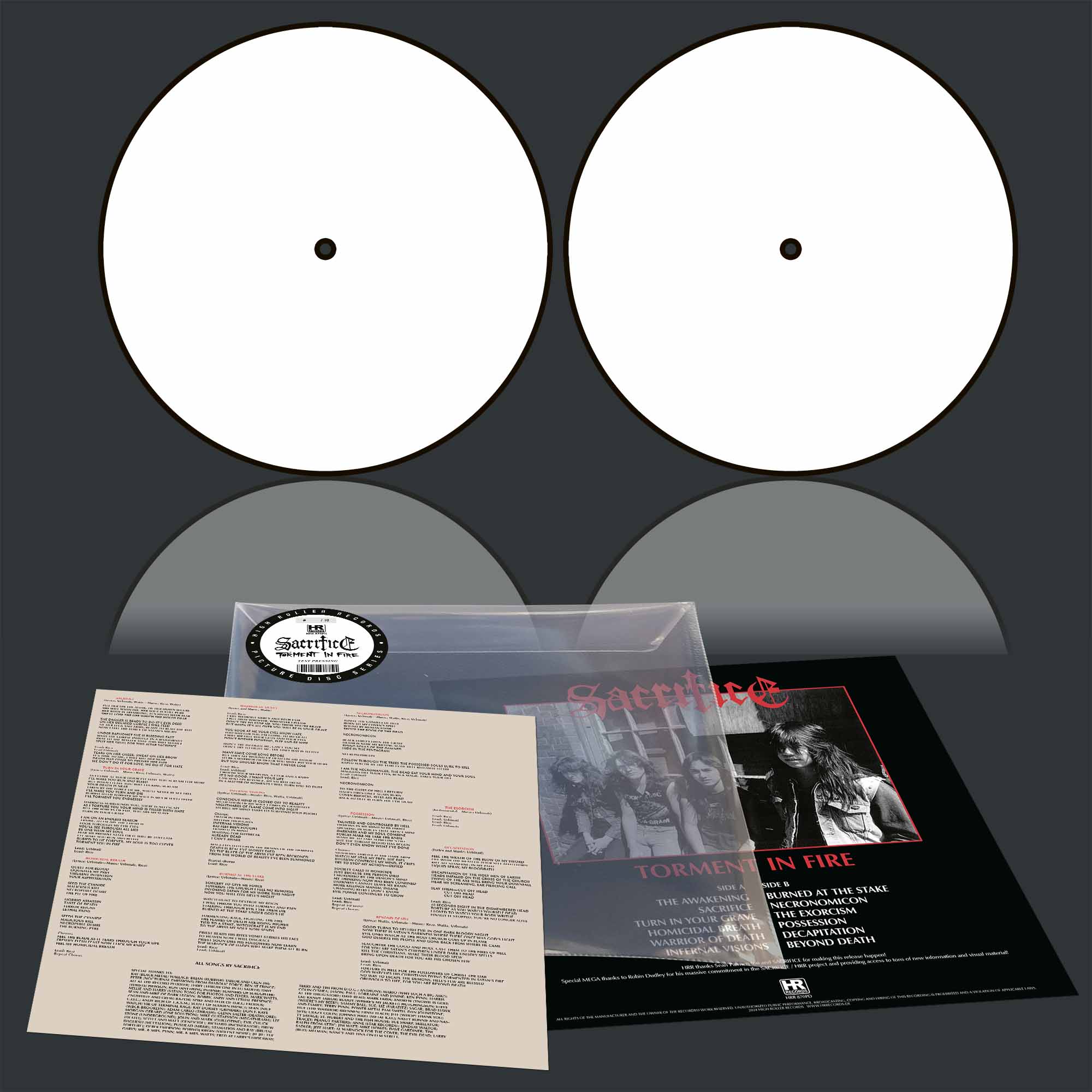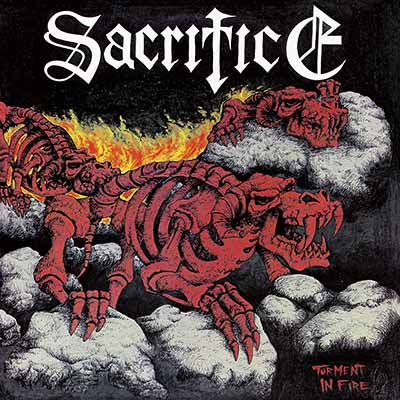 | ||||
| SACRIFICE - Torment in Fire LP | |
HRR 870LP, 425gsm heavy cardboard cover, 4 page insert, lyric sheet, poster, A5 photo card, 1st PRESSING: ltd 2000, 700 x black vinyl, 700 x ultra clear w/ red & yellow "fire" splatter, 350 x oxblood + 250 x grey/ oxblood bi-color vinyl (HRR mailorder exclusive) 2nd PRESSING: 500 x 180g black vinyl PICTURE DISC: HRR 871PD, ltd 524, handnumbered, deluxe platic bag, cardboard insert | |
| Rob Urbinati - guitar & lead vocals Joe Rico - lead guitar Scott Watts - bass and backing vocals Gus Pynn - drums | |
| 01 The Awakening 02 Sacrifice 03 Turn in Your Grave 04 Homicidal Breath 05 Warrior of Death 06 Infernal Visions 07 Burned at the Stake 08 Necronomicon 09 The Exorcism 10 Possession 11 Decapitation 12 Beyond Death | |
| 1st pressing: colored vinyl available 2nd pressing: AVAILABLE Picture Disc: AVAILABLE | |
Following on from first generation Canadian speed metal pioneers Anvil and Exciter and heavily influenced by local Toronto thrash legends Razor, Scarborough’s own Sacrifice set out to make history a short while later in 1984.
Scarborough is situated at the east end of Toronto, roughly a 20-minute drive away from the city (or alternatively a good hour by public transport). Although there is no question that downtown Toronto was the mecca for metalheads in Ontario, Scarborough always had its own local scene, as Terry Sadler of Slaughter (close friends of Sacrifice) recalls in the book »Eve Of Darkness – Toronto Heavy Metal In The 1980s«: “As long as I can remember, almost every street in Scarborough had a house with bands playing in garages and basements. Musicians placed signs everywhere looking for other musicians to form bands. Rush, Triumph and Nazareth played my high school. Everybody who was in any way cool was into rock and heavy metal in Scarborough – it was everywhere.”
Rob Urbinati (vocals, guitar) and Joe Rico (guitar) were living about two blocks away from each other in an area of Scarborough called Malvern, where they bonded over guitars, borrowed each other’s records and talked about starting band. Scott Watts on bass and Gus Pynn on drums completed the first stable Sacrifice line-up in 1984. Rob and Joe were still attending high school at the time. Rob Urbinati takes over the story: “Joe knew Scott and the three of us jammed a few times. It was hard to find a drummer that could play fast and knew about the kind of underground metal we were into. We had a couple of drummers before Gus, but we consider the four of us to be the original line-up. Once we started recording real demos, it was with Gus. When he joined, we knew that we could finally move forward.”
Although Scarborough had one record store with a decent metal section, Star Records, bands like Sacrifice, Slaughter, Lab Animals or Dark Legion didn’t play local clubs. According to Rob Urbinati Toronto was the place to go: “We would hang out at The Record Peddler or see bands at Larry’s Hideaway. Most of the local bands were like traditional metal. We wanted to start something new.” Fellow guitarist Joe Rico adds: “The metal underground was just in its infancy then and we got to meet all the people that had similar musical tastes as us. The Record Peddler was the place to go and grab some new music. Rob and I would save our allowance or whatever money we got and go down and buy new import records. I still have most of them and a bunch of 7” singles too.”
As could be expected, Anvil and Exciter did leave a big impression on the young Sacrifice. Rob confirms: “Both had a big influence on us, two bands that were playing some of the heaviest music in the world at that time, and they were both from our home province of Ontario.”
After their self-financed debut mini-album »Armed And Dangerous« Razor managed to ink a deal with Canadian major label Attic Records, surely this was a sign for Sacrifice too that it was not impossible to record an album and get a record deal in their home country? “We had no doubt that we would release an album,” Rob Urbinati looks back. “It was an exciting time to be in a band, you could feel that things were changing and the fact that Razor and Voivod were doing well definitely pushed us.” To which Joe Rico adds: “To me it was a great thing that they were finally putting some money into the kind of bands and the music we liked.”
By 1985, Sacrifice had written seven original songs and started to play locally, their first live gig was supporting one of the first bands of Sebastian Bach (who went on to form Skid Row in the US of A). How did that come about? “There weren’t any other bands around like us to play with,” explains Rob Urbinati. “We appreciated being able to play a show, even if it was polar opposites of the metal spectrum.” Joe Rico has some more details: “Our manager Ray ‘Black Metal’ Wallace got us that show. We just did it because we wanted to play and we knew our friends would show up and just thrash. So it was a sure thing.”
In general though, Sacrifice preferred to share a stage with thrash metal bands or local punk/hardcore acts, says Rob: “Playing with Razor or Slaughter was way better for us. We went to a lot of hardcore shows and that crowd accepted us right from the beginning. A lot of the punk scene had seen us at shows and knew that we were part of that too. Both metal and punk was coming together in a big way.” “We wanted to play shows with our friends,” stresses Joe Rico. “We wanted to see them as much as they wanted to see us, so we just made sure we always gave local bands some shows.”
Sacrifice worked hard in the rehearsal room and steadily progressed, as a result they were soon becoming a force to be reckoned with, as their artist and photographer Harry Tong recalls in the fantastic book »Eve Of Darkness – Toronto Heavy Metal In The 1980s«: “They would take whatever shows they could, even if there was no money involved; they just wanted to perform live and get out there. Their earliest sets at Larry’s Hideaway contained a mix of originals and covers of Metallica and Slayer, two of the biggest bands of the Californian thrash metal scene. In fact, one time they did a Slayer tribute show at Larry’s, for which I made the flyer. Sacrifice became the matching band from Canada; no other band could compare across the country. As musicians, they knew what they were doing and the didn’t hold back.”
It was Brian Taylor, an employee at the legendary Record Peddler on Yonge Street, who financed the band’s first demo called »The Exorcism«. “Brian was extremely helpful to us, and helped get us started,” comments Rob Urbinati. “We looked up to him, he worked at The Record Peddler, had an amazing radio show, and was the singer for local hardcore band Youth Youth Youth. He offered us to do a demo and he would sell the cassettes which got our name out. Brian was almost like in the band. He recorded all our classic stuff, we were good friends and to this day, any time we see him it’s like no time has passed.”
All seven tracks of the demo later ended up on the band’s first album »Torment In Fire«, along with newly written tunes “Homicidal Breath”, “Infernal Visions”, “Necronomicon” and “Possession”. For Rob Urbinati the new numbers “felt like they were a progression, but I think we knew that we could progress even further.” “We were going into another direction after the original songs got written,” is how Joe Rico sees it. “We were taking our instruments more serious and really started to structure songs better. Rob is a great songwriter, he is very creative that way.”
The mentioned song titles sound as if they were coming straight out of the Venom textbook, laughs Rob Urbinati: “Oh, Venom had a massive impact on us. Horror movies too though, I think any movie fan would have no problem figuring out what movie influenced what song.”
In 1986, Ben Hoffman, the owner of The Record Peddler, financed the first Sacrifice album »Torment In Fire« and put it out on his own label Fringe Product, of which guitarist Joe Rico says: “To this day everyone loves that record and some consider it our most original. It was really good for its time I would say.” His colleague Rob Urbinati sounds a bit more reserved though: “Well, obviously I wish we were tighter and it sounded better, but on the other hand, I wouldn’t change a thing really. That is how it was then. Young bands recording albums while still learning their instruments. That’s kind of what makes the old albums great. There is no bullshit. No one thought they could actually get big playing such heavy music. We all just wrote the most aggressive music we could with what we had. I didn’t even own my own guitar then. That black strat copy on the cover was a ‘Vantage Avenger’ that belonged to my brother. It had single coil pick-ups. We didn’t even have real amps yet, we rented some to record. None of our families had much money but somehow we managed to get this band together and get it done with what little we had.”
Metal Blade, who licensed »Torment In Fire« for the United States, even flew the band to Los Angeles to give interviews and hold signing session, which was much appreciated by Rob Urbinati back then: “It was great to see so many people wanting their records signed and the amount of interviews they had set up for us.” Joe Rico has not forgotten either: “Yeah, Rob and I went to L.A. and hang out, do some interviews and such. We got to hang out with Katon from Hirax and watch Dark Angel rehearse. It was amazing.”
Brian Taylor also made the trip to L.A. along with the band, stating in the book »Eve Of Darkness – Toronto Heavy Metal In The 1980s«: “Brian Slagel’s motivation for getting us down there was not to do promotion, he wanted to sign Sacrifice directly. He met with me [...">, and I thought it was a good idea, but it wasn’t up to me to make that decision. It would have been betraying Ben Hoffman of Fringe Records big time.”
With Razor, Slaughter and Voivod the second wave of Canadian metal was in full swing in 1986 and of course Sacrifice eventually shared a stage with each of the three bands, as Rob Urbinati recalls: “Yes, we mainly played with Razor and Slaughter, but we did get to play with Voivod eventually at the ‘No Speed Limit’ festival in Montreal which was our first big show right after »Torment In Fire« came out.”
The album also made it to Europe via import and was reviewed in various metal magazines around the world. Renowned American journalist Borivoj Krgin (who was writing for several metal magazines during the 1980s, amongst them Metal Forces in the UK) had good things to say about »Torment In Fire«: “One of the things I find most impressive about this Canadian quartet are the amazingly powerful and highly original vocals of guitarist/vocalist Rob Urbinati. He spits out some of the most gut-wrenching vocals ever and makes some of the weaker tracks sound a lot more enjoyable. Overall, »Torment In Fire« will certainly turn out to be one of the top albums of 1986. With the new material like ‘Cyanide’ and ‘Afterlife’ being even better, Sacrifice is sure to become one of the biggest death/thrash metal bands on the scene. Absolutely essential.”
“There wasn’t that much press yet, but we were excited to get reviews,” remembers Rob Urbinati, “most of our press was from fanzines.” Joe Rico has one regret though: “We started to build a good following in Europe, but sadly we never made it there when it was imperative.”
MATTHIAS MADER
